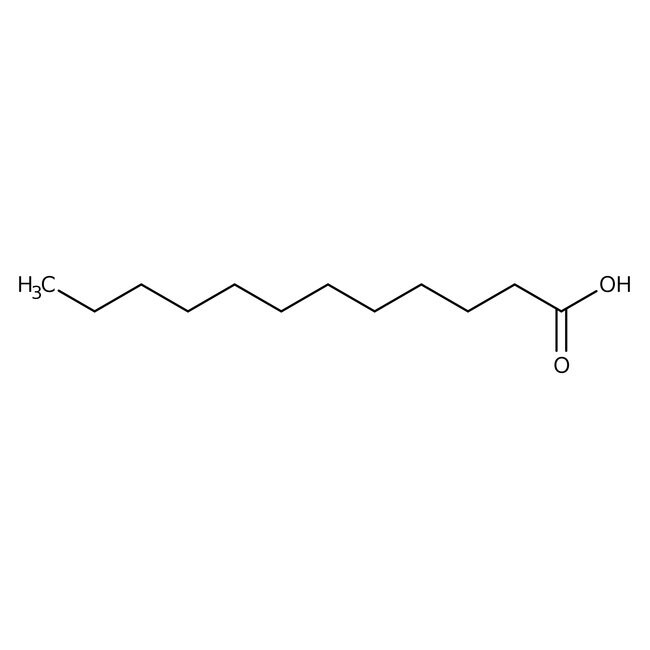Search Thermo Fisher Scientific
Thermo Scientific Chemicals
Dodecanoic acid, 98%, Thermo Scientific Chemicals
Catalog number A11672.36
also known as A11672-36
Price (USD)/ Each
26.65
Online exclusive
29.10 Save 2.45 (8%)
-
Quantity:
500 g
Price (USD)/ Each
26.65
Online exclusive
29.10 Save 2.45 (8%)
Dodecanoic acid, 98%, Thermo Scientific Chemicals
Catalog numberA11672.36
Price (USD)/ Each
26.65
Online exclusive
29.10 Save 2.45 (8%)
-
Chemical Identifiers
CAS143-07-7
IUPAC Namedodecanoic acid
Molecular FormulaC12H24O2
InChI KeyPOULHZVOKOAJMA-UHFFFAOYSA-N
SMILESCCCCCCCCCCCC(O)=O
View more
Specifications Specification Sheet
Specification Sheet
Appearance (Color)White
Assay (Aqueous acid-base Titration)≥97.5 to ≤102.5%
Melting Point (clear melt)42.0-48.0?C
Identification (FTIR)Conforms
FormCrystals or powder or crystalline powder or flakes
View more
Dodecanoic acid is used in the preparation of cosmetics, soaps, alkyd resins and wetting agents. It is also used to measure the molar mass of an unknown substance through freezing point depression. It is also used as a food additive and an active component in a treatment for acne. In addition to this, it is a substrate for acylation of certain proteins based on the murine studies.
This Thermo Scientific Chemicals brand product was originally part of the Alfa Aesar product portfolio. Some documentation and label information may refer to the legacy brand. The original Alfa Aesar product / item code or SKU reference has not changed as a part of the brand transition to Thermo Scientific Chemicals.
Applications
Dodecanoic acid is used in the preparation of cosmetics, soaps, alkyd resins and wetting agents. It is also used to measure the molar mass of an unknown substance through freezing point depression. It is also used as a food additive and an active component in a treatment for acne. In addition to this, it is a substrate for acylation of certain proteins based on the murine studies.
Solubility
Soluble in water, benzene, acetone, alcohol, petroleum ether, dimethyl sulfoxide and dimethyl formamide. Slightly soluble in chloroform.
Notes
Incompatible with bases, oxidizing agents and reducing agents.
Dodecanoic acid is used in the preparation of cosmetics, soaps, alkyd resins and wetting agents. It is also used to measure the molar mass of an unknown substance through freezing point depression. It is also used as a food additive and an active component in a treatment for acne. In addition to this, it is a substrate for acylation of certain proteins based on the murine studies.
Solubility
Soluble in water, benzene, acetone, alcohol, petroleum ether, dimethyl sulfoxide and dimethyl formamide. Slightly soluble in chloroform.
Notes
Incompatible with bases, oxidizing agents and reducing agents.
RUO – Research Use Only
General References:
- Touchy, A. S.; Kon, K.; Onodera, W.; Shimizu, K. I. Unprecedented Reductive Esterification of Carboxylic Acids under Hydrogen by Reusable Heterogeneous Platinum Catalysts. Biopolymers 2015, 357 (7), 1499-1506.
- Garcia, A. C.; Serafim, F. A.; Keukeleire, D. D.; Franco, D. W. Evaluation of Glycerol Profiles in Sugarcane Spirits (Cachaças). J. Braz. Chem. Soc. 2015, 26 (1), 57-63.

